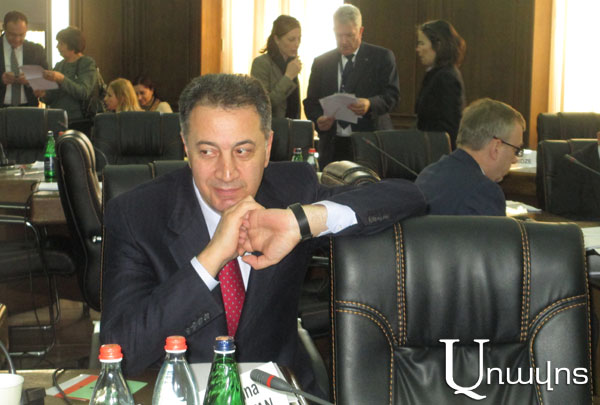Today, at the session of the Euronest PA Committee on Economic Integration, Legal Approximation and Convergence with EU Policies, the RA Minister of Economy Karen Chshmaritian said that Armenia highly appreciates the maintenance and continuity of the current level of the economic cooperation with the EU. At present discussions are going on at the experts’ level in the direction of new formats of the RA-EU bilateral trade-economic cooperation. Discussions are also underway on cooperation in the aviation industry and negotiations are held on the RA-EU common aviation zone. “The EU markets are becoming increasingly interesting for the Armenian manufacturers. Armenia gives much importance and appreciates the provision of the budgetary and technical support by the EU.”
Karen Chshmaritian assured that the EU is one of the most important trade-economic partners of Armenia. Pasquale de Micco, Representative of the EP Policy Department, DG for External Policies, presented the study “When choosing means losing: the Eastern partners, the EU and the Eurasian Economic Union.” He had compared the Deep and Comprehensive Free Trade Area Agreement with the EaEU Treaty. When presenting the economic situation in Armenia, he pointed out that Armenia has a deficit of 26.2 percent, which is a major trade deficit, which is partially restored by foreign remittances, mostly from Russia. Moldova also has a deficit of 26.2 percent, but it receives transfers from abroad, more than Armenia. “It is interesting to observe Armenia’s trading partners: the EU is the first – 27.9%, Russia ranked the second – 24.3 percent. Armenia depends on Russia with energy – 100 percent, but there is a pipe with Iran, which will be exploited in the near future.”
In Pasquale de Micco’ words, two models function for the integration of the post-Soviet region: the Customs Union and the Free Trade Agreement. “Over the years, all post-Soviet countries have signed bilateral free trade agreements with each other. The situation is as follows: we have two types of agreements. The main reason for the two agreements is the Ukraine, which never wanted to join the Customs Union. Ukraine at this time will lose its share in trade with Russia. One can clearly see that the Deep and Comprehensive Free Trade Agreement is more effective in the long run, will create a better business environment, and there will be investments if the energy and other sectors are reformed, monopolies are eliminated and so on. In the short run, it is much more costly. The expenses generate from Russia’s political counteractions. When a country chooses a different path than the EaEU, Russia defines high prices on energy and other products for them. Russia raises the prices artificially. Official Moscow sets trade embargos. I cannot say that the trade embargo is illegal, but is viewed as such by the EU, because most of these embargos generated from the political motives.”
According to Luc Devigne, Representative of EP Directorate General for Trade, “We were surprised when we first heard in pretty harsh environment that the Russian officials were saying that they will not stop the movement of the truck to Ukraine, as long as the EU Association Agreement has not been terminated. The point is that we are suggesting an agreement to the countries, while Russia was suggesting a Customs Union. In our case, it was a friendship because Armenia could sign agreements with whom it wants; it was free to sign agreements with A, B, C, and D countries too. While, in the case of the Customs Union, it is something like a marriage, after joining the CU, you can no longer have free trade and cooperation. The EU allowed Armenia to maintain its existing free trade agreements, such as with Georgia. And why has not Russia allowed Armenia to maintain free trade agreements with the EU? The EU has proposed a free trade agreement, and the country has chosen the Customs Union. Russia applied to hostile regulatory restrictions for the countries that decided to go by another way. I am talking about Ukraine and Moldova.”


























































